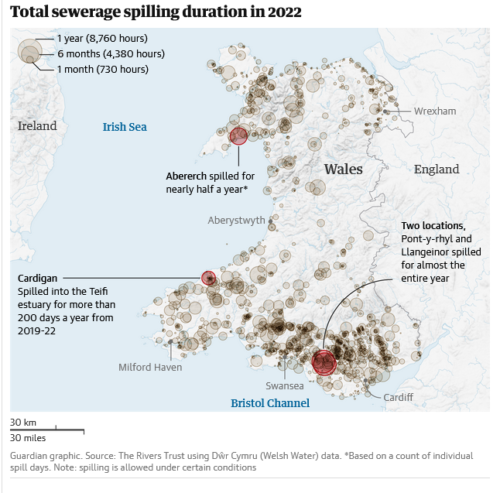Sewage systems overflow during periods of heavy rain, and companies are allowed to discharge when they reach a certain level to prevent waste backing up into homes, but not before.
Peter Hammond, a former UCL professor who campaigns for Windrush Against Sewage, has collated data, which shows Welsh Water was discharging sewage before it reached its stipulated overflow level, which means it should have been treating it, but was not. He asked the Welsh RiversTrust, as well as local anglers, for suggestions for outflows to look at.
The data, from 11 Welsh sewage plants, found that 10 released untreated waste before their stipulated overflow level had been reached. The worst-performing plant was Cardigan, which spilled for more than 200 days a year from 2019-22, and it almost never treated the sewage it was supposed to. The treatment plant spills into the Teifi estuary, where there is one of Europe’s largest populations of bottlenose dolphins. Welsh Water said in response that the nearby Poppit Sands beach had water rated “excellent”.
This pattern is repeated in England. Earlier this year the high court heard that in 2022 52% of the raw sewage discharges from the 14,000 storm overflows that were monitored spilled more than 10 times. Eleven per cent discharged raw sewage more than 60 times. As such they had been in breach of the law – the urban wastewater (England and Wales) regulations 1994. The environmental watchdog in England recently declared that ministers might have broken the law over sewage dumping.
Welsh Water told the BBC it has between 40 and 50 wastewater treatment plants currently operating in breach of their permits, and that decisions on improvements were taken with customer bills in mind.
A spokesperson added: “Regarding Cardigan works specifically, we had already identified the issue there being linked to saltwater entering the works, which impacts the treatment process. We reported this to Natural Resources Wales (NRW) and agreed to undertake investment to improve the situation.” They are now investing a further £20m to ensure compliance with their discharge permit, and have disclosed the issues to NRW.
Natural Resources Wales has issued a statement in response to the issues noting “We are aware of significant compliance issues at the Cardigan wastewater treatment works, and we have used our regulatory powers to enforce the improvements required at the site over the years. The issue is now unresolvable without significant investment and upgrading of infrastructure by Dŵr Cymru Welsh Water”.
To read the full article in The Guardian click here.
To read the full statement from Natural Resources Wales click here.
